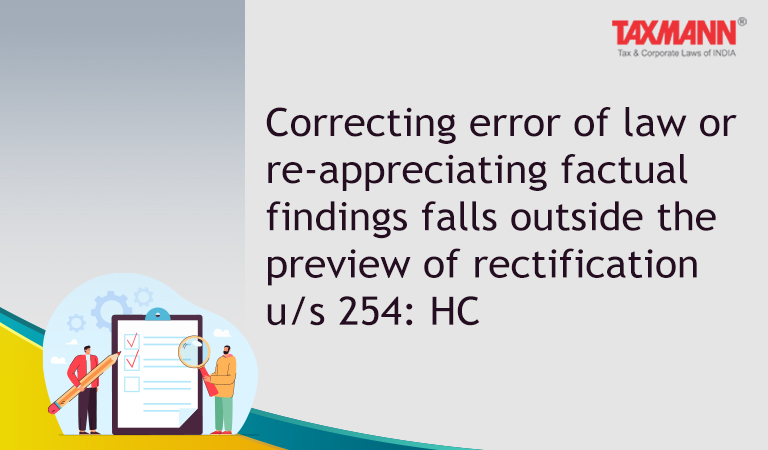Correcting error of law or re-appreciating factual findings falls outside the preview of rectification u/s 254: HC
- Blog|News|Income Tax|
- 3 Min Read
- By Taxmann
- |
- Last Updated on 20 December, 2021

Case Details: Vrundavan Ginning and Oil Mill v. Assistant Registrar/President - [2021] 126 taxmann.com 227 (Gujarat - HC)
Judiciary and Counsel Details
-
- J.B. Pardiwala and Ilesh J. Vora, JJ.
- Darshan R. Patel for the Petitioner. Mrs. Mauna M. Bhatt and Karan Sanghani, Adv. for the Respondent.
Facts of the Case
The assessee was a partnership firm. The Assessing Officer (AO) passed an order under section 143(3) and made several additions to assessee’s total income. One of the addition was made on account suppression in value of closing stock. Aggrived by the order of AO, the assessee filed an appeal before the CIT(A). The CIT(A) confirmed the order of AO holdng that the assessee had not followed either of the method of valuation of closing stock, i.e., either on the basis of cost price or market price, whichever is lower, rather the assessee had followed net realizable value which is purely an ad-hoc method and without any basis. It was also held that the net realization method was neither based on cost price nor calculated on the basis of market price; thus, there was no scientific method of calculation of the net realizable value.
On further appeal, the Appellate Tribunal also rejected the appeal of the assessee. However, the assessee noticed from the order of the Tribunal that while adjudicating the grounds of appeal, some arguments or decisions had not been taken into cognizance and, therefore, it filed an application under section 254 requiring tribunal to rectify its order.
The rectification application was rejected by the Tribunal stating that the power of rectification under section 254 of the Income-tax Act can be exercised only when the mistake, which is sought to be rectified, is an obvious patent mistake and apparent from the record and not a mistake, which is required to be established by arguments and long drawn process of reasoning on points, on which there may conceivably be two opinions.
Being dissatisfied with the rejection of rectification application by the Tribunal, the assesse filed the instant writ before the High Court.
High Court Held
The High Court dismissed the writ petition by holding that the Appellate Tribunal, in its own way, had discussed the said issue and recorded a particular finding.
If the writ applicant was dissatisfied, then it was always open for him to prefer an appeal under section 260A of the Income-tax Act before the High Court and in the course of the appeal, if the Court is convinced that the tribunal had not taken cognizance of agruments of the assessee, then it may remit the matter to the Tribunal for fresh consideration.
The power to rectify an order under section 254(2) is extremely limited and it does not extend to correcting errors of law or re-appreciating factual findings. Thus, if assessee was aggrieved as regards findings recorded by Tribunal, it would open to it to seek its appellate remedies, in accordance with law.
List of Cases Referred to
-
- Master Construction Co. (P) Ltd. v. State of Orissa [1966] 17 STC 360 (SC) (para 11)
- Satyanarayan Laxminarayan Hegde v. Mallikarjun Bhavanappa Tirumale AIR 1960 SC 137 (para 11)
- CIT v. Income Tax Appellate Tribunal [2005] 204 CTR 349 Delhi (para 13)
- Dattani and Co. v. ITO [2014] 41 taxmann.com 360 (Guj.) (para 16)
- CIT v. Maruti InsuranceDistribution Services Ltd. [2012] 26 taxmann.com 68/[2013] 212 Taxman 123 (Delhi) (para 19).
Disclaimer: The content/information published on the website is only for general information of the user and shall not be construed as legal advice. While the Taxmann has exercised reasonable efforts to ensure the veracity of information/content published, Taxmann shall be under no liability in any manner whatsoever for incorrect information, if any.

Taxmann Publications has a dedicated in-house Research & Editorial Team. This team consists of a team of Chartered Accountants, Company Secretaries, and Lawyers. This team works under the guidance and supervision of editor-in-chief Mr Rakesh Bhargava.
The Research and Editorial Team is responsible for developing reliable and accurate content for the readers. The team follows the six-sigma approach to achieve the benchmark of zero error in its publications and research platforms. The team ensures that the following publication guidelines are thoroughly followed while developing the content:
- The statutory material is obtained only from the authorized and reliable sources
- All the latest developments in the judicial and legislative fields are covered
- Prepare the analytical write-ups on current, controversial, and important issues to help the readers to understand the concept and its implications
- Every content published by Taxmann is complete, accurate and lucid
- All evidence-based statements are supported with proper reference to Section, Circular No., Notification No. or citations
- The golden rules of grammar, style and consistency are thoroughly followed
- Font and size that’s easy to read and remain consistent across all imprint and digital publications are applied




 CA | CS | CMA
CA | CS | CMA
